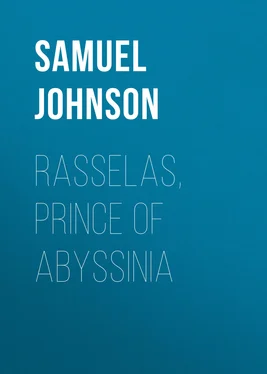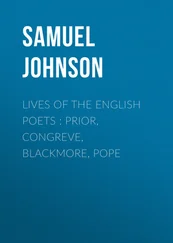Samuel Johnson - Rasselas, Prince of Abyssinia
Здесь есть возможность читать онлайн «Samuel Johnson - Rasselas, Prince of Abyssinia» — ознакомительный отрывок электронной книги совершенно бесплатно, а после прочтения отрывка купить полную версию. В некоторых случаях можно слушать аудио, скачать через торрент в формате fb2 и присутствует краткое содержание. Жанр: foreign_humor, Юмористические книги, literature_18, foreign_antique, на английском языке. Описание произведения, (предисловие) а так же отзывы посетителей доступны на портале библиотеки ЛибКат.
- Название:Rasselas, Prince of Abyssinia
- Автор:
- Жанр:
- Год:неизвестен
- ISBN:нет данных
- Рейтинг книги:3 / 5. Голосов: 1
-
Избранное:Добавить в избранное
- Отзывы:
-
Ваша оценка:
- 60
- 1
- 2
- 3
- 4
- 5
Rasselas, Prince of Abyssinia: краткое содержание, описание и аннотация
Предлагаем к чтению аннотацию, описание, краткое содержание или предисловие (зависит от того, что написал сам автор книги «Rasselas, Prince of Abyssinia»). Если вы не нашли необходимую информацию о книге — напишите в комментариях, мы постараемся отыскать её.
Rasselas, Prince of Abyssinia — читать онлайн ознакомительный отрывок
Ниже представлен текст книги, разбитый по страницам. Система сохранения места последней прочитанной страницы, позволяет с удобством читать онлайн бесплатно книгу «Rasselas, Prince of Abyssinia», без необходимости каждый раз заново искать на чём Вы остановились. Поставьте закладку, и сможете в любой момент перейти на страницу, на которой закончили чтение.
Интервал:
Закладка:
“At length my father resolved to initiate me in commerce; and, opening one of his subterranean treasuries, counted out ten thousand pieces of gold. ‘This, young man,’ said he, ‘is the stock with which you must negotiate. I began with less than a fifth part, and you see how diligence and parsimony have increased it. This is your own, to waste or improve. If you squander it by negligence or caprice, you must wait for my death before you will be rich; if in four years you double your stock, we will thenceforward let subordination cease, and live together as friends and partners, for he shall be always equal with me who is equally skilled in the art of growing rich.’
“We laid out our money upon camels, concealed in bales of cheap goods, and travelled to the shore of the Red Sea. When I cast my eye on the expanse of waters, my heart bounded like that of a prisoner escaped. I felt an inextinguishable curiosity kindle in my mind, and resolved to snatch this opportunity of seeing the manners of other nations, and of learning sciences unknown in Abyssinia.
“I remembered that my father had obliged me to the improvement of my stock, not by a promise, which I ought not to violate, but by a penalty, which I was at liberty to incur; and therefore determined to gratify my predominant desire, and, by drinking at the fountain of knowledge, to quench the thirst of curiosity.
“As I was supposed to trade without connection with my father, it was easy for me to become acquainted with the master of a ship, and procure a passage to some other country. I had no motives of choice to regulate my voyage. It was sufficient for me that, wherever I wandered, I should see a country which I had not seen before. I therefore entered a ship bound for Surat, having left a letter for my father declaring my intention.”
CHAPTER IX
THE HISTORY OF IMLAC ( continued )
“When I first entered upon the world of waters, and lost sight of land, I looked round about me in pleasing terror, and thinking my soul enlarged by the boundless prospect, imagined that I could gaze around me for ever without satiety; but in a short time I grew weary of looking on barren uniformity, where I could only see again what I had already seen. I then descended into the ship, and doubted for awhile whether all my future pleasures would not end, like this, in disgust and disappointment. ‘Yet surely,’ said I, ‘the ocean and the land are very different. The only variety of water is rest and motion. But the earth has mountains and valleys, deserts and cities; it is inhabited by men of different customs and contrary opinions; and I may hope to find variety in life, though I should miss it in nature.’
“With this thought I quieted my mind, and amused myself during the voyage, sometimes by learning from the sailors the art of navigation, which I have never practised, and sometimes by forming schemes for my conduct in different situations, in not one of which I have been ever placed.
“I was almost weary of my naval amusements when we safely landed at Surat. I secured my money and, purchasing some commodities for show, joined myself to a caravan that was passing into the inland country. My companions, for some reason or other, conjecturing that I was rich, and, by my inquiries and admiration, finding that I was ignorant, considered me as a novice whom they had a right to cheat, and who was to learn, at the usual expense, the art of fraud. They exposed me to the theft of servants and the exaction of officers, and saw me plundered upon false pretences, without any advantage to themselves but that of rejoicing in the superiority of their own knowledge.”
“Stop a moment,” said the Prince; “is there such depravity in man as that he should injure another without benefit to himself? I can easily conceive that all are pleased with superiority; but your ignorance was merely accidental, which, being neither your crime nor your folly, could afford them no reason to applaud themselves; and the knowledge which they had, and which you wanted, they might as effectually have shown by warning as betraying you.”
“Pride,” said Imlac, “is seldom delicate; it will please itself with very mean advantages, and envy feels not its own happiness but when it may be compared with the misery of others. They were my enemies because they grieved to think me rich, and my oppressors because they delighted to find me weak.”
“Proceed,” said the Prince; “I doubt not of the facts which you relate, but imagine that you impute them to mistaken motives.”
“In this company,” said Imlac, “I arrived at Agra, the capital of Hindostan, the city in which the Great Mogul commonly resides. I applied myself to the language of the country, and in a few months was able to converse with the learned men; some of whom I found morose and reserved, and others easy and communicative; some were unwilling to teach another what they had with difficulty learned themselves; and some showed that the end of their studies was to gain the dignity of instructing.
“To the tutor of the young princes I recommended myself so much that I was presented to the Emperor as a man of uncommon knowledge. The Emperor asked me many questions concerning my country and my travels, and though I cannot now recollect anything that he uttered above the power of a common man, he dismissed me astonished at his wisdom and enamoured of his goodness.
“My credit was now so high that the merchants with whom I had travelled applied to me for recommendations to the ladies of the Court. I was surprised at their confidence of solicitation and greatly reproached them with their practices on the road. They heard me with cold indifference, and showed no tokens of shame or sorrow.
“They then urged their request with the offer of a bribe, but what I would not do for kindness I would not do for money, and refused them, not because they had injured me, but because I would not enable them to injure others; for I knew they would have made use of my credit to cheat those who should buy their wares.
“Having resided at Agra till there was no more to be learned, I travelled into Persia, where I saw many remains of ancient magnificence and observed many new accommodations of life. The Persians are a nation eminently social, and their assemblies afforded me daily opportunities of remarking characters and manners, and of tracing human nature through all its variations.
“From Persia I passed into Arabia, where I saw a nation pastoral and warlike, who lived without any settled habitation, whose wealth is their flocks and herds, and who have carried on through ages an hereditary war with mankind, though they neither covet nor envy their possessions.”
CHAPTER X
IMLAC’S HISTORY ( continued )—A DISSERTATION UPON POETRY
“Wherever I went I found that poetry was considered as the highest learning, and regarded with a veneration somewhat approaching to that which man would pay to angelic nature. And yet it fills me with wonder that in almost all countries the most ancient poets are considered as the best; whether it be that every other kind of knowledge is an acquisition greatly attained, and poetry is a gift conferred at once; or that the first poetry of every nation surprised them as a novelty, and retained the credit by consent which it received by accident at first; or whether, as the province of poetry is to describe nature and passion, which are always the same, the first writers took possession of the most striking objects for description and the most probable occurrences for fiction, and left nothing to those that followed them but transcription of the same events and new combinations of the same images. Whatever be the reason, it is commonly observed that the early writers are in possession of nature, and their followers of art; that the first excel in strength and invention, and the latter in elegance and refinement.
Читать дальшеИнтервал:
Закладка:
Похожие книги на «Rasselas, Prince of Abyssinia»
Представляем Вашему вниманию похожие книги на «Rasselas, Prince of Abyssinia» списком для выбора. Мы отобрали схожую по названию и смыслу литературу в надежде предоставить читателям больше вариантов отыскать новые, интересные, ещё непрочитанные произведения.
Обсуждение, отзывы о книге «Rasselas, Prince of Abyssinia» и просто собственные мнения читателей. Оставьте ваши комментарии, напишите, что Вы думаете о произведении, его смысле или главных героях. Укажите что конкретно понравилось, а что нет, и почему Вы так считаете.












